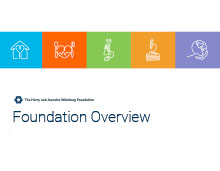Two Baltimore grantees recently completed an innovative housing development aimed at combating homelessness and providing quality affordable housing for city residents.
Sojourner Place at Oliver — a first of its kind in the city and state — consists of 70 new apartments that include a mix of one-, two-, and three-bedroom units, as well as a computer lab and fitness center. Half of the apartments are reserved for individuals and families experiencing chronic homelessness who are referred to the project by the Mayor’s Office of Homeless Services. The rest of the units are for households with incomes of 50% or less than the area median income.
Episcopal Housing Corporation, an affordable housing developer, and Health Care for the Homeless, one of Baltimore’s largest providers of permanent supportive housing services, teamed up for this project. While the two organizations have collaborated previously, this is the first project for which Health Care for the Homeless served as co-developer and provider of individualized services — such as assistance with transportation, health care, or other basic needs — that help residents remain in their new homes and thrive.
Creating more supportive housing units and addressing the needs of individuals who experience homelessness are among the Foundation’s grantmaking priorities. The state of Maryland’s low-income housing tax credit program made this project possible through funds set aside specifically for supportive housing.
The state also allowed Health Care for the Homeless to use a Weinberg grant for project costs typically paid through a mortgage loan. This, in turn, enabled the nonprofit to use funds that would have gone toward mortgage payments to instead cover services that are essential to help residents successfully transition to their new homes. This model of philanthropic and government partnership, and innovative funding allocation, is one the Foundation hopes other projects will replicate.
Over the past year, Weinberg has invested in building the capacity of nonprofit developers across the country, including in Hawaii and New York. This has included providing grants for these organizations to establish an internal revolving fund, a pool of money to support the predevelopment activities necessary to get projects off the ground, such as land purchases and architectural drawings.
This year, a grant to Episcopal Housing Corporation will help create a fund to better equip the organization to seize development opportunities and compete with private for-profit developers for building sites. Leveraging the Foundation’s support, the developer expects to secure additional funding to contribute to the production of even more supportive housing units in Baltimore over the next several years. A separate grant to Health Care for the Homeless enabled the nonprofit to launch a real estate development entity that will further boost the production of such housing in the city.
Photo credit: Health Care for the Homeless




